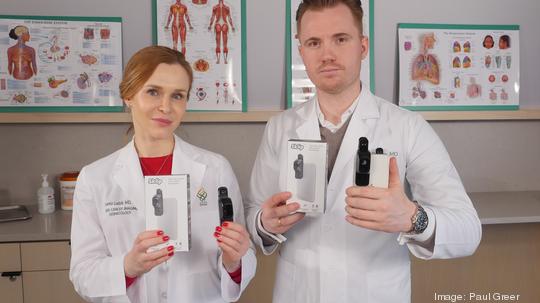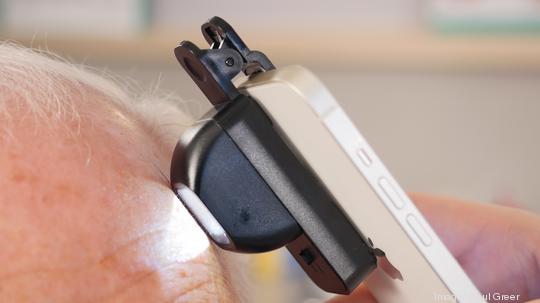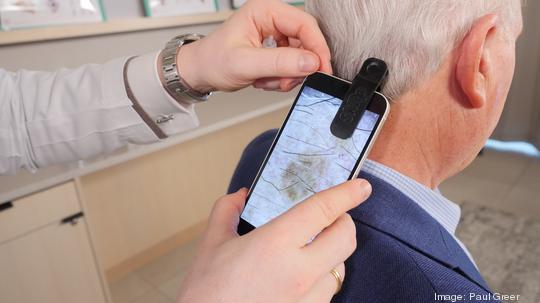
It can take weeks or even months to get a suspicious-looking mole, one that may or may not be cancerous, checked out by a dermatology provider.
If melanoma is caught early, the survival rate is 98%. If not, it can drop as low as 23%, according to the Melanoma Research Alliance.
If only there were a way to triage the most concerning skin lesions and get those patients into a doctor’s office quicker, before serious problems occur.
Two Portland dermatologists, who also happen to be a married couple, believe they have a solution. Dr. Alex Witkowski and Dr. Joanna Ludzik developed both a special lens that clips onto a smartphone or tablet to take a high-grade image of a mole and the artificial intelligence to flag suspect lesions and route patients to a dermatologist within a week.

The two founded a company called Sklip Inc., which received a Breakthrough Device Designation from the U.S. Food and Drug Administration in July. They are anticipating FDA clearance for the system next year. Given that skin cancer is the most common cancer in the U.S. and one in five Americans will develop it in their lifetime, according to the American Academy of Dermatology Association, the potential market is vast.
“We would be very happy if every skin cancer household had at least one device,” Witkowski said.
‘Easy to use’
Witkowski grew up in California speaking Polish at home with his immigrant parents. Ludzik is from Krakow, Poland, where they both earned their medical degrees, though they didn’t meet until a few years later. He was pursuing his PhD at the University of Modena in Italy, and she ended up doing a fellowship there in that field.
Witkowski and Ludzik focused on virtual biopsies with a technology called “reflectance confocal microscopy” for the early detection of skin cancers. The pair introduced this technology, which can reduce the need for physical biopsies by 50%, in Poland, where they moved after Italy.
Then in 2019, OHSU recruited the couple to co-direct the Skin Cancer Imaging Center, bringing virtual biopsies to Oregon patients. Witkowski and Ludzik have since diagnosed the world’s smallest skin cancer and melanoma, which pending final validation, should appear in the Guinness World Book of Records in 2023.
But backing up to 2017, the couple co-founded Sklip, investing $500,000 of their own money to get the business off the ground and pursue research and development of an easy-to-use “dermatoscope” and the AI to go with it.
“Our goal is to drive the use of noninvasive tools,” Witkowski said. “We wanted to make a solution that was easy to use and inexpensive — that’s the whole idea of Sklip.”
Dermatoscopes, which consists of a magnifying lens that affords a view of subsurface colors that can’t be discerned with the naked eye, are used to triage skin lesions prior to a biopsy. The instruments are expensive and difficult to use for sending an image to a patient’s chart, Witkowski said.
What’s unique about Sklip is that it can be clipped onto a phone with no adapter. It uses its own light and produces a medical-grade image. It took the couple nine months to design the special lens inside. The scope retails for $150, half of what other dermatoscopes cost, Wiktowski said.

Sklip has sold 5,000 of its special dermatoscopes in Europe and 5,000 in the U.S. Users pay a fee of $10 per mole and upload the images anonymously through the Sklip app. A dermatologist at the back end evaluates the image and gives an opinion within 24 hours. If the expert flags it as suspicious, the app finds a verified doctor who can see the person within seven days and perform a biopsy, if necessary.
Once Witkowski and Ludzik receive full clearance from the FDA, the AI will do the evaluation and return a result in seven seconds. Clinical studies have shown the Sklip AI algorithm to have a sensitivity of 95% and specificity of 84% to detect melanoma, Witkowski said.
Since most skin checks are done not by MDs, but by nurse practitioners and physician assistants, they could use the Sklip system to assist in their triage.
The couple also hopes to get the Sklip device into retail stores for use by the general public.
“What it results in is earlier diagnosis,” Witkowski said, “Our motto is to catch the inevitable early.”
CLOSER LOOK
SKLIP INC.
What: A clip-on dermatoscope to take medical-grade images of skin lesions, along with AI to triage suspicious moles and connect people with a dermatology practice, if necessary.
Co-founders: Dr. Alex Witkowski, who is also CEO, and Dr. Joanna Ludzik
Founded: 2017 in Krakow, Poland



